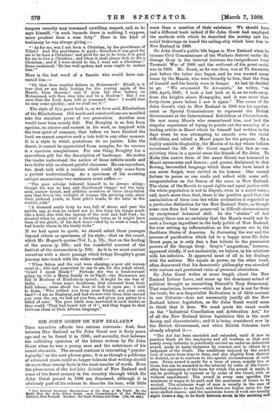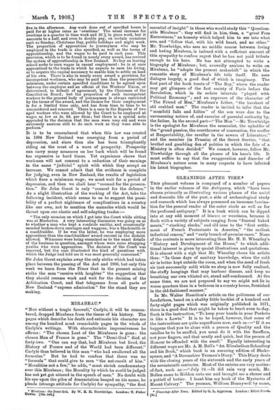SIR JOHN GORST ON NEW ZEALAND.*
THIS narrative affords two curious contrasts : first, that between New Zealand as Sir John Gorst saw it forty years ago and as he found it in 1906; and secondly, that between the rollicking cynicism of the letters written by Sir John Gorst when he was a young man and the sedateness of his recent chronicle. The second contrast is interesting " psycho- logically," as the cant phrase goes; it is as though a politician of advanced years could no longer tolerate that writing should do more than convey facts in the least number of words. Even the phenomena of the hot-lake district of New Zealand and some of the finest scenery in the country through which Sir John Gorst passed in 1906 are dismissed, although it is obviously part of his scheme to describe his tour, with little • New Zealand Revisited: Recollections of the Days of My Youth. By the Bight Hon. Sir John Eldon Grorst, once Commissioner of the Waikato District., New Zealand. London : Sir Isaac Pitman and Soon. [12s. 6d. net] more than a mention of their existence. We should have had a different book indeed if Sir John Gorst had employed the methods with which he described the mutiny and the
social bickerings on board the sailing-ship which bore him to New Zealand in 1860.
Sir John Gorst's public life began in New Zealand when he became Civil Commissioner of the Waikato district under Sir George Grey in the interval between the insignificant local Taranaki War of 1860 and the outbreak of the great racial war in 1863. Mr. Gorst, as he was then, was at Te Awamutu just before the latter war began, and he was warned many times by the Maoris, who were friendly to him, that the lives of himself and his family were in danger. At last he decided
to go. " We evacuated Te Awamutu," he writes, " on 18th April, 1863 ; I took a last look at it, as we rode away, from the heights above Mangapiko, and it was more than forty-three years before I saw it again." The cause of Sir John Gorst's visit to New Zealand in 1906 was his appoint-
ment as Special Commissioner to represent the British Government at the International Exhibition at Christchurch.
He met many Maoris who remembered him, and had the singular experience of trying to puzzle out the meaning of a leading article in Maori which he himself had written in the days when he was attempting to smooth over the racial diffinulties, and edited a Maori paper for the purpose. By a highly amiable illogicality, the Maoris of to-day whose fathers threatened the life of Mr. Gorst regard that fact as con- stituting them in a special sense the friends of Sir John. Te Kohe (the native form of the name Gorst) was honoured in Maori ceremonies and dances ; and poems, declaimed -in that flowing, bevowelled language which those who have heard it can never forget, were recited in his honour. One cannot forbear to pause as one reads and reflect with some self-
congratulation on the fusion of the races in New Zealand. The claim of the Maoris to equal rights and equal justice with the white population is not in dispute, even in a social sense ; and, much more than that, there is the positive good that the assimilation of them into the white civilisation is regarded as
a particular distinction for the New Zealand State, as though some rare flora had been preserved in difficult circumstances by exceptional botanical skill. In the " sixties " of last
century there was no certainty that the Maoris would not be each a foreign ingredient in the body politic of New Zealand, for ever setting up inflammation, as the negroes are in the Southern States of America. In discussing the war and the process of pacification which led to a happy issue Sir John Gorst pays, as is only due, a fine tribute to the persuasive powers of Sir George Grey. Grey's " magnetism," however, appeared chiefly, if not exclusively, we believe, in his relations
with his inferiors. It appeared most of all in his dealings with the natives. His equals in power, on the other hand, often discovered that his democratic philosophy was streaked with curious and persistent veins 1 personal absolutism.
Sir John Gorst writes at some length about the New Zealand Labour Laws, and sums up the dominant school of political thought as resembling Dieraeles Tory Democracy. That conclusion, however—which we dare say is not far from the truth, for non-Imperialist Radicalism is of little account in our Colonies—does not necessarily justify all the New Zealand labour legislation, as Sir John Gorst would seem to think that it does. We must quote his exact words on the " Industrial Conciliation and Arbitration Act," for of all the New Zealand labour legislation this is the most daring and characteristic; and it is being considered now by the British Government, and other British Colonies have already adopted it :—
" The Act has been amended and extended, until it now in practice binds all the employers and all workers, so that now nearly every industry is practically carried on under an industrial award, made in many instances by consent, and in others by a judgment of the Court. The conditions imposed by the award vary of course from time to time, and also slightly from district to district, so as to conform to the special circumstances of each case. Every award is made for a term of years, usually two or three, but can be amended in the interval by order of the Court: after the expiration of the term for which the award is made, it can be prolonged by consent or by order of the Court, with or without amendment. The award in every case specifies the minimum of wages to be paid, and the maximum of hours to be worked. The minimum wage of men is usually in the case of unskilled workers ls. an hour, and there are higher rates for the more skilled classes : and the maximum hours of work are usually eight hours a day, to be fixed between seven in the morning and five in the afternoon. Any work done out of specified hours is .paid for at higher rates as ' overtime.' The usual increase for overtime is a quarter in time work and 25 % in piece work, but it amounts to a half, and even to double pay, on certain occasions such as Sunday, Christmas Day, public, holidays and night work. The proportion of apprentices to journeymen who may be employed in the trade is also specified, as well as the terms of apprenticeship, and the wages to be paid in each year. This provision, which is to be found in nearly every award, has revived the system of apprenticeship in New Zealand. No boy on leaving school seeks to earn wages in casual employment : he is at once apprenticed to the trade in which he expects to earn his living, or to acquire the capital necessary to enable him to settle on land of his own. There is also in nearly every award a provision for incompetent workmen, who may be paid less than the prescribed minimum, under certain specified conditions to be agreed upon between the employer and an official of the Workers' Union, or determined, in default of agreement, by the Chairman of the Conciliat:on Board; but the proportion of such incompetent workers to the general body of journeymen is always restricted by the terms of the award, and the licence for their employment is for a limited time only, and has from time to time to be reconsidered and renewed. There is a case in the Reports of two aged workers who were allowed by the Court to be employed at wages as low as 2s. 6d. per diem; but there is a special note appended to the decision that the men were very old and were extremely anxious still to do such work as they were able to perform."
It is to be remembered that when this law was created in 1894 New Zealand was emerging from a period of depression, and since then she has been triumphantly riding on the crest of a wave of prosperity. Prosperity can carry many measures on her back which will be found too expensive in hard times. Yet experience shows that workmen will not consent to a reduction of their earnings in the same "judicial" spirit with which they accept an increase. We cannot admit that the evidence is complete for judging, even in New Zealand, the results of legislation which fixes a minimum wage; we must wait for a period of depression, and then we shall hear "counsel for the prosecu- tion." Sir John Gorst is only "counsel for the defence." As a slight illustration of the working of the Act, take the following incident, which seems to us to suggest the possi- bility of a perfect nightmare of complications in a country like our own, not to mention the manacles which would be thrust upon our elastic and self-adapting trades :— " The only occasion on which I got into the Court while sitting was at Masterton. A very interesting discussion was going on as to whether a man who kept a roadside smithy, and occasionally mended broken-down carriages and waggons, was a blacksmith or a coachbuilder. If he was the latter, he was employing more apprentices than the coachbnilders' award current in the district allowed. Witnesses were being examined as to the exact details of the business in question, amongst whom were some strapping youths who were apprentices. The decision of the Court was reserved, but the case illustrated the kind of questions with which the Judge had told me it was most generally concerned."
Sir John Gorst explains away the only strike which had taken place between the passing of the Act and 1906, but only this week we learn from the Times that in the present mining strike the men "receive with laughter" the suggestion that they should resume work and wait for the decision of the Arbitration Court, and that telegrams from all parts of New Zealand "express admiration" for the stand they are making.















































 Previous page
Previous page